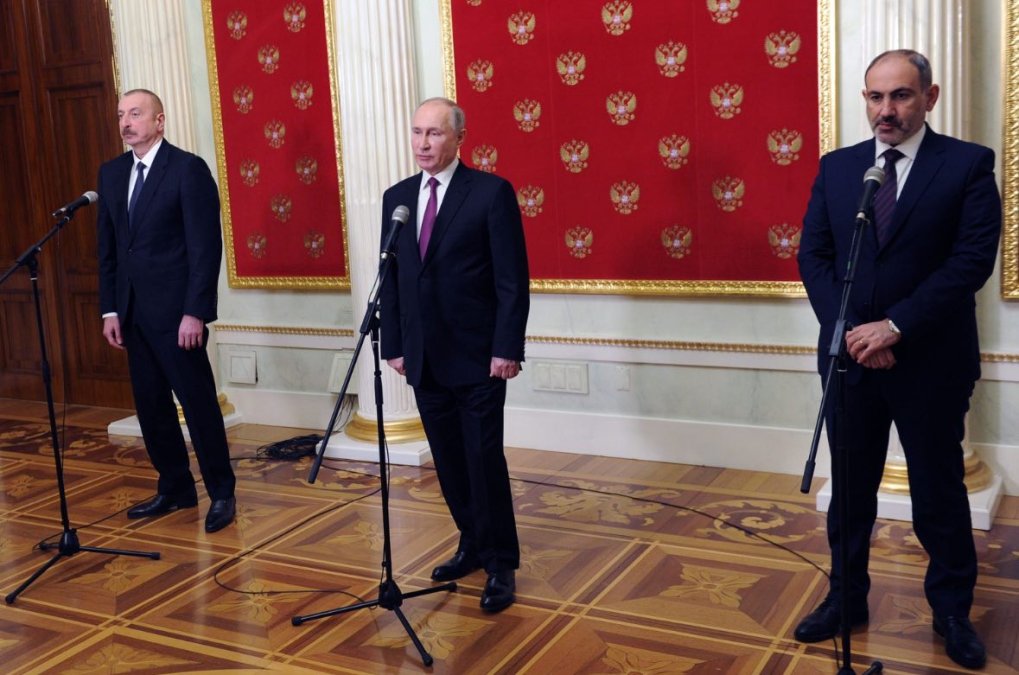The Caucasus without Putin: Armenia and Azerbaijan’s shift towards the West
The Caucasus without Putin: Armenia and Azerbaijan’s shift towards the West
Currently, Moscow, which is embroiled in the Ukraine war, has somewhat lost its influence in its southern borders, particularly Armenia and Azerbaijan. According to analysts from the IranGate news agency, this shift in the balance of power has paved the way for other international players like Turkey, the European Union, and the United States to enter and increase their presence in the region.
Nikol Pashinyan, the Prime Minister of Armenia, and Ilham Aliyev, the President of Azerbaijan, met on July 10th in Abu Dhabi to discuss a potential peace agreement. The important point was that no mediator, not even Russia, was present at this meeting. Although the meeting did not have any tangible results, both sides emphasized their commitment to direct negotiations and taking steps to build mutual trust in a joint statement.
This situation contrasts sharply with just five years ago. After the 44-day Nagorno-Karabakh war in 2020, a predominantly Armenian region legally part of Azerbaijan and always a source of tension between the two countries, Vladimir Putin mediated a ceasefire and re-established Moscow’s traditional role in the region.
Rauf Mirgadirov, an analyst for the newspaper Ayna Zerkalo in Baku, says that this ceasefire marked the beginning of a historic change. He believes that after more than thirty years of conflict over Karabakh, the two countries are now closer and distancing themselves from Russia. They want to become independent because Russia is deeply involved in Ukraine.
Additionally, Ruben Mehrabyan from the Armenian Institute of International Relations and Security points out that Yerevan has taken advantage of this situation to diminish Russia’s presence. He believes that Russia wanted to keep Armenia in a state of heightened tension to present itself as a savior, but Armenia has decided to resolve its disputes and reduce Russia’s influence.
The differences between Armenia and Russia intensified in 2016. That year, Moscow’s mediation resulted in a ceasefire, but Armenia felt that Russia acted in favor of Baku and provided limited support.
Richard Giragosian, founder of the Regional Studies Center in Yerevan, notes that Armenia’s trust in Russia as its security partner began to erode at that time, and Russia gradually leaned towards Azerbaijan.
After the 2020 war, this gap deepened. Baku once again took control of Karabakh, but Russia did not fully support Yerevan. Moscow’s influence in Armenia weakened further, especially after the arrest of Samvel Karapetyan, a Russian-Armenian billionaire, on June 17th, which analysts interpreted as a sign of the Armenian government’s efforts to prevent Russian interference in upcoming elections.
The arrest of priest Bagrat Galstanyan also indicated internal tensions and Russia’s reaction. Russian Foreign Minister Lavrov called this move baseless attacks on the church, while the Armenian Foreign Minister said Moscow was interfering in internal affairs.
Relations between Moscow and Baku have also gradually cooled. In late June, Aliyev canceled meetings with Russian officials, including the Deputy Prime Minister, and halted Russian cultural programs in Baku. This action was in response to the killing of two Azerbaijani Tatars in Russia and reports of their torture.
Russia’s role in the Zangezur corridor has also been challenged. This passage, located between Azerbaijani territory and Nakhchivan and placed under Russian FSB oversight according to the 2020 agreement, is seen by Armenia as a threat to its sovereignty.
Pashinyan has announced that after the peace treaty, no foreign forces will be stationed at the border. On the other hand, for Baku, Russian control has become less appealing, as direct negotiations are a priority for them.
With Russia’s influence waning, powers like Turkey, the European Union, and the United States are rapidly increasing their presence and influence in the region.
Turkey, in particular, plays a key role in trade and energy connectivity, while Azerbaijan has become a regional gas hub, transporting Russian goods to Europe via Turkey and Azerbaijan.
In this context, Armenia has been rebuilding its relations with Turkey, and in June, Pashinyan met with Erdogan. Mehrabyan says the country hopes to access the European market instead of the Russian one by opening the Turkish border.
Meanwhile, Yerevan is speculating about expanding cooperation with the United States and the European Union, including signing a strategic partnership charter with the US and aligning domestic laws with EU standards for potential membership.
Overall, the current situation indicates a decline in Russia’s traditional influence in the South Caucasus and the emergence of new players who have taken influential positions.

